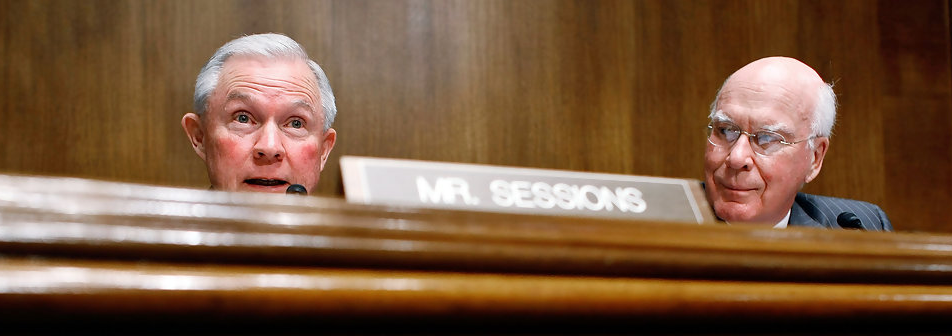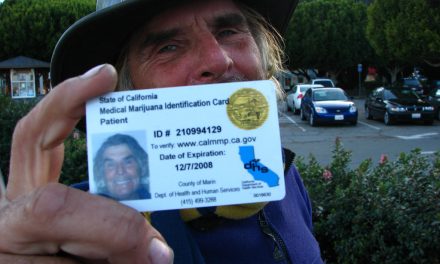From Lanny Swerdlow, RN LNC, a posted hedded ” The End of Rohrabacher/Farr Amendment Will Give AG Designate Jeff Sessions the Opening to Unleash Federal Cops and Lawyers in California.” (The Rohrbacher/Farr Amendment, which expires in late April, prevents the DEA from spending money on raids that circumvent state laws protecting marijuana producers and consumers.)
US Attorney General designate Jeff Sessions underwent his confirmation hearing on January 10 and his testimony on marijuana was anything but reassuring. Although some commentators have written that his statements were wishy-washy and noncommittal, I believe his responses portend a major crackdown in states that have legalized marijuana whether for medical or recreational adult-use.
After hours of questioning on a variety of issues, Senator Patrick Leahy (D-Vt) was able to ask Senator Sessions about how he would view marijuana policy as AG:
Senator Leahy: “Would you use our federal resources to investigate and prosecute sick people using marijuana in accordance with state law even though it might violate federal law?”
Senator Sessions: “I won’t commit to never enforcing federal law, Senator Leahy, but absolutely it is a problem of resources for the federal government. The Department of Justice under Lynch and Holder set forth some policies that they thought were appropriate to define what cases should be prosecuted in states that have legalized, at least in some fashion marijuana, some parts of marijuana.”
Senator Leahy: “Do you agree with those guidelines?”
Senator Sessions: “I think some of them are truly valuable in evaluating cases, but the fundamentally the criticism I think that is legitimate is that they may not have been followed. Using good judgement on how to handle these cases will be a responsibility of mine I know it won’t be an easy decision but I will try to do my duty in a fair and just way
Senator Leahy: “The reason I mention this, is because you have some very strong views, you even mandated the death penalty for second offense on drug trafficking, including marijuana, even though mandatory death penalties are of course unconstitutional.
Senator Sessions: “Well I’m not sure under what circumstances I said that, but I don’t think…”
Senator Leahy: “Would you say it’s not your view today?”
Senator Sessions: “(laughs) It is not my view today.”
After that exchange, Senator Mike Lee (R-UT) followed up with questions regarding how marijuana policy factors into federalism and asked if the way the Obama Administration has handled marijuana laws created any issues with separation of powers and states’ rights. Sessions replied that:
“One obvious concern is the United States Congress has made the possession in every state and distribution an illegal act. If that’s something that is not desired any longer Congress should pass a law to change the rule, it is not the Attorney General’s job to decide what laws to enforce.”
Although Sessions didn’t say he would be coming after states that legalized marijuana in opposition to federal law, he certainly didn’t say he wouldn’t and his statement that “it is a problem of resources” and that “it is not the Attorney General’s job to decide what laws to enforce” leaves the door wide open for beginning a new federal crackdown on states whose citizens have decided that it’s time for a change in marijuana policy.
Unlike reproductive rights, immigration policy and climate change, marijuana policy has never been at the forefront of the concerns of Trump’s base. I would imagine that the Trump Administration is well aware that the majority of Americans, and that includes Trump’s base, feel marijuana should be legalized or at the very least left up to the states on whether to legalize. However one of Trump’s biggest supporters to whom he feels a special allegiance is cops and they would like nothing better than to see his Administration declare war on marijuana legalization and go all-out to bury it.
Although Sessions is a big proponent of states’ rights, it usually doesn’t apply to issues that he opposes like same-sex marriage. Even if marijuana was one of Session’s major out-of-the-gate concerns, there is little he can do because of the Rohrabacher/Farr amendment which prevents the DOJ from enforcing federal law in states with state-wide regulation systems for the distribution of marijuana.
The Rohrabacher/Farr amendment expires on April 28, 2017. The Amendment passed because it was supported by over 90% of the Democrats in Congress and by around 25% of the Republicans. If Trump and Sessions put the pressure on those Republicans to oppose it, then the Amendment could very well go down in defeat. If Congress does not renew it, then Sessions will be free to do whatever he wants. Based on what Sessions said and didn’t say at his confirmation hearings, it would be foolish in the extreme to wager on Sessions’ continuing the Obama Administration’s policy of non-interference.
Of concern is what actions we can expect from the feds and what our range of responses can be. Although the ambiance is dark, there is more than one light beaming in from the end of the tunnel and those will be forthrightly discussed, presented and analyzed in the next newsletter.
Check out Lanny Swerdlow’s newsletter at the Marijuana Anti-Prohibition Project site





